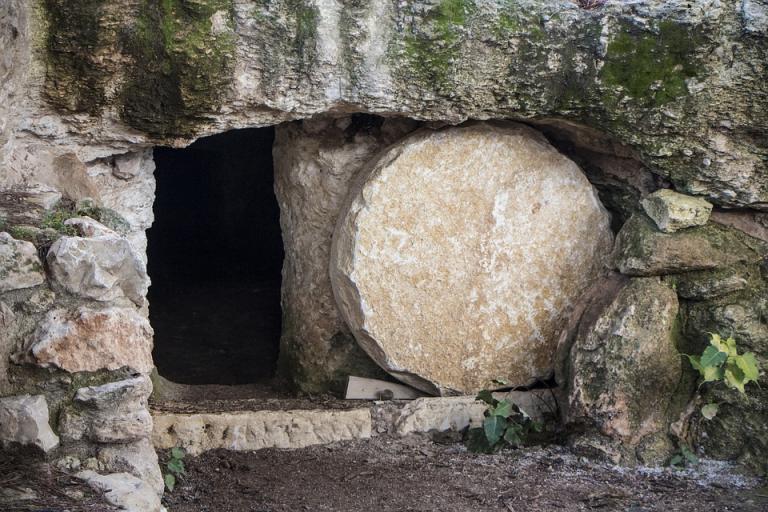
Usually, we talk about the Risen Christ around Easter. But it is perhaps more fitting to explore the significance of the Resurrection on a day like today, the day after the election, when our collective imagination has been transfixed by party politics and we begin to ask “now what?”
Perhaps the juxtaposition between electoral politics and the Resurrection of Jesus seems jarring. Bear with me.
I remember one particular Easter service when my son, Jonas, was 4 years old. Jonas overheard everyone repeating “Christ is Risen.” Instinctively, since he’d already been to a number of protests, he assumed we were uttering a protest chant. After all, that has been the only context in which he had heard such chanting. He started walking around, fist thrusting into the air, shouting “CHRIST IS RISEN!” As I saw him fuse the spiritual to the political, I realized he was the most theologically accurate person in the room.
Mary thinks Jesus’ body is stolen. Peter notices that someone rolled up the death linens and laid them in place. We are told that the Disciples didn’t understand the Scriptures (and we aren’t even told which Scriptures they might be). And in being confronted by the reality of an empty tomb, the disciples just go home. They apparently go back to life-as-usual because they simply can’t make sense of what has happened. Each of the Gospels paint the Resurrection as a confusing event. It isn’t what you’d expect—it isn’t Jesus coming back glowing white. It isn’t even (as is increasingly popular to believe today) a seemingly mystical event that changes people at their core—at least not at first.
Today, we respond the same way. The Resurrection has interrupted our world: the world of space, time and matter, the world of real history and real people and real life, but our minds and imaginations are too small to contain it. After all, what does Easter Sunday have to do with Election Tuesday?
Everything. Today, as our minds are still dripping with electoral goo, let us focus our hearts and minds on the Resurrection.
The Resurrection is about God’s judgment, calling the world to account and setting up a new, glorious creation of freedom and peace, and summoning all people everywhere to live in this new world. The Resurrection is about God’s rich welcome to all humankind.
The Gospel isn’t primarily about life after death. It isn’t about escaping this toxic and corrupted earth for a better ethereal plane.
No, the Gospels present the Resurrection as something that has meaning for the here-and-now. Jesus has risen. He is the Lord of this earth. And now we, the followers of this Jesus, have work to do.
Jesus is risen. May we too rise.
Because Jesus is raised from the dead, God’s new world has begun. The Resurrection isn’t some obscure “add on” to the life and teachings of Christ. It is its fulfillment. For three years, Jesus spoke words of revolution. But Easter is really when the revolution begins. As Rafael Avila writes: “The resurrection is the ultimate basis for rebellion.”
The Resurrection is hope for all those who live dominated and enslaved by a system of death that manifests itself in all levels of society and flavors all relationships. It is hope for those entangled in death.
By practicing Resurrection, we not only embrace the hope of a far-off resurrection of the dead, but also defiantly embrace life and fullness in the face of death and deprivation.
So, did you vote yesterday? Now, then, how will you vote today? And the day after that.
We must give our lives to sowing seeds of justice and peace. We must wake up every day and vote for life and love in the face of death–by making choices, large and small, to resist oppression and create space for goodness to flourish.
That is the vote that we must cast every day.
If you care about poverty and voted your values yesterday, but go through the rest of your life only donating a dollar here and there to help the poor, then do you honestly want things to change?
If you care about homelessness and voted your values yesterday, but you have never entertained the idea of giving folks a place to sleep, or explored options with your church or friends beyond simply pointing people to a shelter (which is not a home, nor is it usually safe), or given real time and resources to organizations working, on the ground, for affordable and accessible housing, then ask yourself “Do I really care about homelessness?”
Many people of faith hate war. But their retirement funds (and their denominational funds) are tied up in petroleum and weapons manufacturing (
Thrivent Financial is one example of this). So if we only signal our hatred of war with our vote on Election Day, do we really hate war?
In the end, our politics is determined by how we live, together as the people of faith, more than who we vote for.
My hope is that we can embrace a politics of Resurrection. Where we no longer put our trust in these death-dealing systems of oppression to be able to sow seeds of life. Instead, let us Rise. Let’s confront violence, build community, and cut ties with those things that we enjoy at the expense of others.
Every day, cast your vote. Make a choice towards the Resurrection–the revolution of God in our midst. For some of us it will mean inviting a stranger to our dinner table. To others, it will mean sharing our wealth in a way that makes us feel uncomfortable. To others, it will mean stepping out of the silence to speak out.
Let us sow, in small ways, seeds of a new world…seeds of revolution. Let’s rise.



